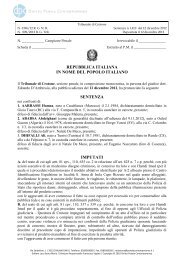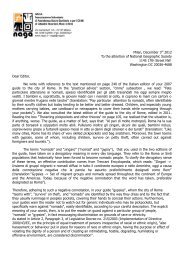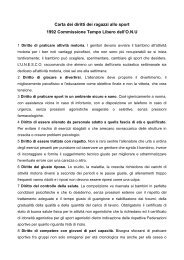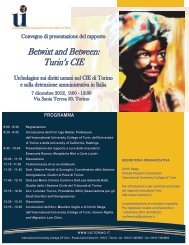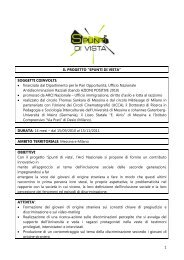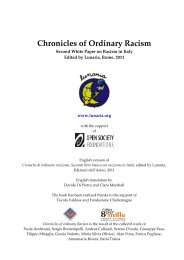Chronicles of ordinary racism 2011 - Cronache di ordinario razzismo
Chronicles of ordinary racism 2011 - Cronache di ordinario razzismo
Chronicles of ordinary racism 2011 - Cronache di ordinario razzismo
- No tags were found...
Create successful ePaper yourself
Turn your PDF publications into a flip-book with our unique Google optimized e-Paper software.
The second innovation is contained in the rules and regulations <strong>of</strong> the thirteen villages. 116<br />
All the “guests” are issued a card known as Dast (Temporary residence authorization<br />
document) that gives them the right to reside in the Rome area for two years. It<br />
represents a true ju<strong>di</strong>cial abnormality: the Dast was issued to many Roma in<strong>di</strong>viduals<br />
with Italian citizenship who, accor<strong>di</strong>ng to the Constitution (article 16, paragraph 1) have<br />
a full right to circulate freely throughout national territory. Conversely, accor<strong>di</strong>ng to the<br />
statute, the Dast can also be issued to immigrants not in possession <strong>of</strong> a residence<br />
permit. 117<br />
The Dast threfore represents a unique case <strong>of</strong> “authorization <strong>of</strong> residence” limited to the<br />
municipal area and separate from the State residence permit issued by police headquarters.<br />
Its purpose is to keep visitors’ behaviour in check. It includes a clause stating that the Dast<br />
can be withdrawn and the in<strong>di</strong>vidual can be evicted from the village when he fails to<br />
comply with a series <strong>of</strong> con<strong>di</strong>tions: keeping the area assigned to him and all communal<br />
buil<strong>di</strong>ngs in order, paying all consumption rates and monthly fees, signing children up<br />
for school and ensuring their regular attendance, making himself available for any job,<br />
cooperating with social workers, not hosting (not even temporarily) any relatives or<br />
friends who don’t have a Dast, no owning <strong>of</strong> pets. Violating these rules can lead to the<br />
entire family unit being evicted from the village. 118<br />
Compared to the policies exclusively based on eviction, the “Roman blueprint” is based<br />
on gathering together Roma who are not (only) “forced out”, but – accor<strong>di</strong>ng to an<br />
expression that gives the title to a dossier published by 21 Luglio – are also “excluded<br />
and rounded up” in semi‐detention and correctional structures, where reception<br />
becomes supervision and exclusion.<br />
Cost (and effectiveness) <strong>of</strong> the “Roman blueprint”<br />
The <strong>di</strong>smantling <strong>of</strong> existing “illegal” settlements and the segregation <strong>of</strong> Roma people in<br />
13 villages outside Rome are both extremely costly operations. Accor<strong>di</strong>ng to the 21<br />
Luglio organisation a sum <strong>of</strong> 34 million euros was set aside for the implementation <strong>of</strong><br />
the “Roma Scheme”. 119<br />
Each <strong>of</strong> the Roma hosted in one <strong>of</strong> the villages costs the Municipality about 500 euros a<br />
month. 120 Bearing in mind that, accor<strong>di</strong>ng to a recent investigation into settlements in<br />
the Capital, about 70% <strong>of</strong> Roma families are made up <strong>of</strong> five or more members, in the<br />
large majority <strong>of</strong> cases the Municipality spends about 2,500 euros a month on each<br />
116 Police Commissioner for the Roma emergency in Lazio, the Regulations for the management <strong>of</strong> travellers’<br />
provisioned villages, quoted.<br />
117 Article 3.1 <strong>of</strong> the aforementioned Regulations for the management <strong>of</strong> villages establishes that access to the<br />
villages is restricted to citizens <strong>of</strong> tertiary countries with regular residence permits, Italian and EU citizens with a<br />
valid identification document, and “people who can prove a 10-year permanent residence in Italy”; furthermore,<br />
point d), declares that “the Municipalities can issue special permits to people outside the aforementioned<br />
categories”. These provisions pave the way to the issuing <strong>of</strong> Dast to immigrants who don’t have a residence permit.<br />
118 Cf. 21 Luglio organisation, Excluded and gathered together (Esclusi e ammassati),quoted., pp. 11-13.<br />
119 21 Luglio organisation, Casilino 900 report, quoted, p. 13.<br />
120 M. Camaioni, A high price for Roma (Roma, un prezzo salato), quoted (that amount is provided by Carlo<br />
Stasolla).<br />
47




